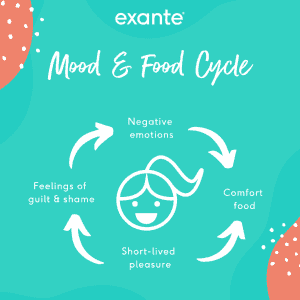
Mental Health Awareness
We all have those days when we wake up feeling a little worse for wear and it's difficult to lift our spirits. It happens to the best of us- we’re only human! That's why we're exploring how you can manage your emotions and whether food affects mood.
Want to know how our mood and emotions affect our weight? Read on as we reveal the connections between mood and food.
Check out the video below where NHS Doctor, Dr Frankie Jackson-Spence shares her tips on living a happy life to improve your mental health.
How does mood affect our daily life?
Nowadays, we don’t prioritise our happiness as much as we deserve. We don’t often look at how our mental health can be affecting our lives, but maybe it’s about time we did. The connection between our mental health and our physical health is strong because our mood can affect us in so many ways; from our brain and our body to the relationships we have with our loved ones.
The good news is that it doesn’t take a lot to cheer us up. Even something as little as finding a £1 in your supermarket trolley, or having a delicious sweet treat can boost our mood [1].
What's the connection between mood and food?
Using food as an occasional treat or reward isn’t such a bad thing. Food should be celebrated after all! But, when we start to habitually use food as a coping strategy, rather than tackling the issue at hand, problems can occur and we quickly find ourselves stuck in a bit of a rut [2].
See, when we’re emotional eating, we’re not usually physically hungry. More likely, we’re eating to dampen how we feel. We also tend to reach for high calorie, high fat or sweet foods that create a temporary satisfaction. Soon after, once we’ve realised what we’ve done, we often experience negative feelings, like guilt and shame – you see how quickly this can become an endless cycle?
So, how can we break the cycle?
Here’s a few little things we can do:

Can food raise our mood?
How about the other way around? Does what we eat affect our mood? The answer, in short, is yes.
We're offering our best tips for ensuring your food isn't controlled by your mood.
- Eat regularly - the more regular our meals, the more stable our blood sugar levels.
- Slow-release carbs – complex, high fibre carbs like wholegrain bread, brown rice and oats, move slowly through the digestive system, resulting in a more graduate blood sugar rise.
- Eat protein – protein also moves slowly through the digestive system. When combined with carbs, it can help dampen the impact on our blood sugar levels.
- Eat a rainbow – eating a wide variety of fruit and veg provides us with the nutrients our bodies need to stay happy [2]. If you’re replacing most of your meals with exante shakes and bars, don’t worry. They’re all enriched with all the essentials, so you can lose weight whilst getting all the vitamins and minerals your body needs!
- Cut down on caffeine – too much caffeine can make us feel anxious or depressed and can also stop us getting a good night’s sleep. Need a replacement? Have you tried our energising caffeine free BURST?
- Fibre – fibre loves our gut! Not only is it digested slowly, it also helps keep things moving – if you know what I mean? The happier we are on the inside, the happier we are on the outside [3].
- Intolerance – some times our bodies don’t react well with certain foods. If you experience this, it’s worth checking with a registered nutritionist or dietitian to rule out any concerns. Some people find that switching to our delicious dairy-free exante vegan range helps reduce symptoms.
Small steps towards everyday happiness
So, how can we respond differently to difficult situations? And how can we welcome everyday happiness? We asked Dr Frankie to give her top Mental Health tips:
“We’re all searching for happiness. For each of us, that will mean a different thing. For some people it will mean having lots of people in their life from friends, family or a relationship, for others it will be financial security. A few things we can put into practice to improve our happiness and wellbeing:
Set yourself small, achievable process goals
If I ever have a big project or goal, I always break it down into achievable chunks. Ticking small goals off my to‐do list more regularly brings smaller doses of happiness and sense of achievement into my everyday life, rather than only sporadically feeling reward when I complete the entire task… which can sometimes feel hugely overwhelming!
Learn to say no to the things that don’t make you happy
We are living in a society where ‘hustle culture’ is trendy and everyone seems busy all the time. Doing things for other people all the time and saying yes to everything, leaving no time for self‐ care or to do things you enjoy will leave you feeling exhausted and unhappy. Say no to things that don’t bring you enjoyment or happiness or don’t benefit your goals
Remember happiness isn’t a destination, it’s a journey
You won’t be happy ‘when’ you’ve bought ‘x’ or when you’ve achieved ‘why’. You’ve got to find happiness in the simple pleasures of everyday life such as the sunshine or your morning coffee!”
Here at exante, we’re dedicated to improving the health and happiness of our loyal customers. Remember, we always love to hear about your exante journey, so don't forget to stay in touch via our Instagram and Facebook. Need a little extra support? Check out our Closed Group to meet our growing exante family and share stories, tips and more!










